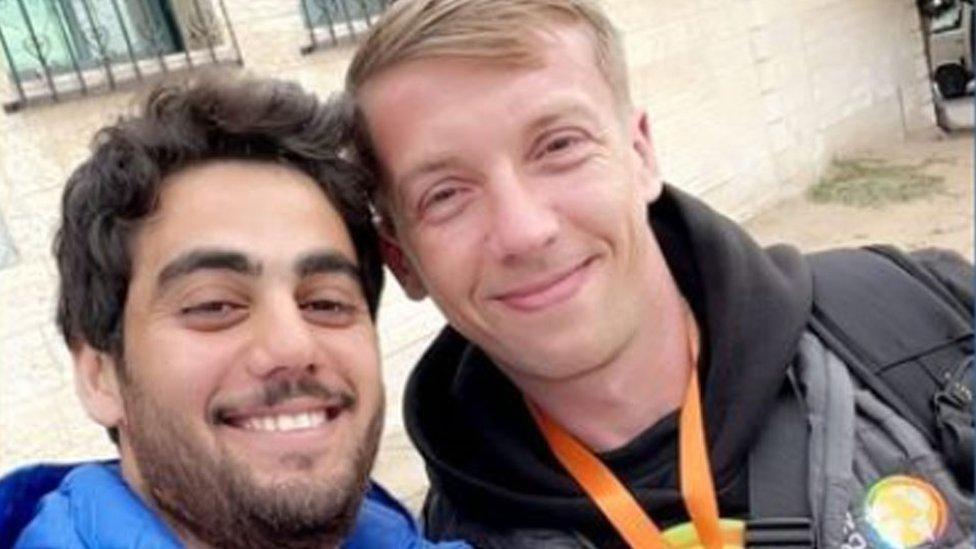Brother of aid worker killed in Gaza criticises arming Israel
- Published
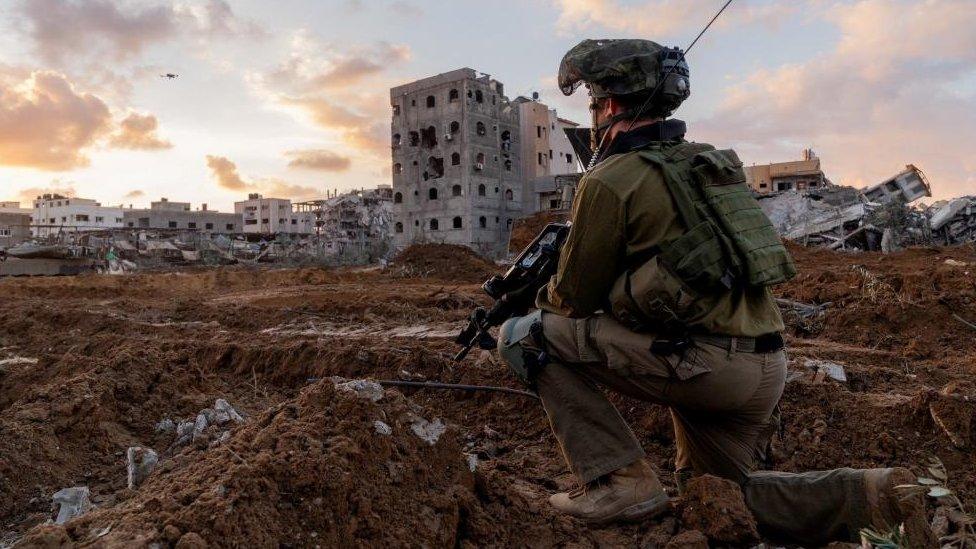
The family of a British aid worker killed by an air strike in Gaza have criticised the sale of arms to Israel.
James Henderson was among seven aid workers who died in the Israeli attack, which his brother called "inexcusable".
Rishi Sunak is under growing pressure after the strike, which also killed Britons John Chapman and James Kirby, as well as Australian, Palestinian, American-Canadian and Polish nationals.
On Tuesday, the PM said the UK had a "very careful" arms licensing regime.
Earlier, 600 legal experts wrote to the government saying weapon exports must end because the UK risks breaking international law over a "plausible risk of genocide" in Gaza.
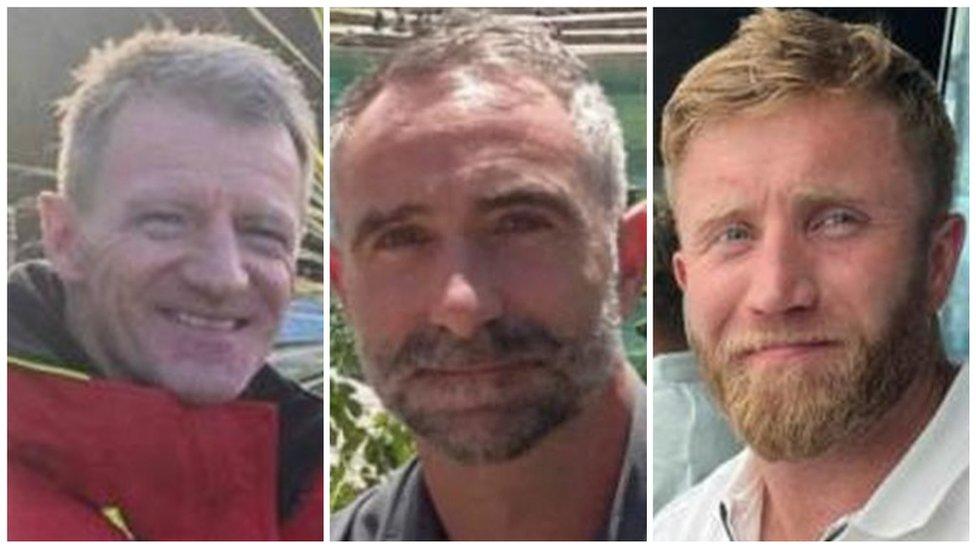
John Chapman, James Kirby and James Henderson were working as security and safety advisors
The group of World Central Kitchen aid workers had just unloaded more than 100 tonnes of food aid and the convoy's movements had been co-ordinated with the Israel Defense Forces (IDF), according to the charity.
Speaking on behalf of the family of former Royal Marine Mr Henderson, his brother - who declined to be named - told the Times, external the killings of people on a humanitarian mission was "inexcusable".
"Accountability is the only hope of justice I have", he said. "I don't believe our government will hold the correct people to account, but I guarantee that our government will sell weapons to Israel, which may in turn be used to kill our fellow citizens.
"It's hard to comprehend that."
British arms sales to Israel are lower than those of other countries, including Germany and Italy, and dwarfed by the billions supplied by its largest arms supplier, the US.
But a UK ban would add to the diplomatic and political pressure on Israel, at a time when its conduct in the Gaza conflict is coming under renewed international scrutiny.
The BBC understands there is an ongoing assessment over whether to suspend or revoke existing export licenses to Israel, which is almost finished.
That assessment, which will advise on the risk of Israel breaching international law, is not a result of the recent air strike. In fact it may not even consider the incident, since it is looking at Israel's actions from early 2024.
Technically it is up to the business secretary to decide on issuing arms export licenses, but one MP familiar with the process said, in reality, it will be Mr Sunak who will make the decision when the Foreign Office issues its legal advice.
On Thursday evening, former UK foreign secretary Jack Straw told the BBC he believed it was "perfectly obvious" Israel was breaching international law.
Mr Straw told Radio 4's PM programme that Israeli forces had been "caught out" by the killing of Western aid workers but suggested they "would have dug in and refused any accountability at all" if all the victims had been Palestinian.
'Serious action is needed'
Former Supreme Court president Lady Hale was among the lawyers, academics and retired senior judges who signed a 17-page letter, external to the government on the issue of arms sales to Israel.
It says "serious action" is needed to "avoid UK complicity in grave breaches of international law, including potential violations of the Genocide Convention".
The group add that the sale of arms and weapons systems to Israel "falls significantly short" of the government's obligations under international law, given the "plausible risk of genocide" in Gaza - a situation that the letters says was highlighted in a provisional judgement issued by the International Court of Justice (ICJ) in January - and the worsening humanitarian situation since.
Watch: Video shows World Central Kitchen vehicles destroyed in Gaza air strike
Speaking on BBC Radio 4's Today programme, Lord Sumption, the former Supreme Court judge who was one of the most notable signatories, said the UK had a duty to prevent genocide and there was a "plausible case that is what is happening" in Gaza.
He added that the "framework of international law around war" does not mean countries can act however they want, even if they have been provoked or attacked, "however outrageously".
Lord Sumption continued: "It doesn't mean to say that you can indiscriminately slaughter innocent civilians and children. It doesn't mean to say you can attack aid convoys... It doesn't mean to say you can spend two weeks flattening hospitals."
Among other actions the letter says the government must take to meet its obligations under international law are:
restoring funding to the UN's agency for Palestinian refugees, UNRWA, after it was suspended over allegations employees were involved in the 7 October attacks on Israel
imposing sanctions on "individuals and entities who have made statements inciting genocide against Palestinians"
suspending ongoing diplomatic and "enhanced trade deal" negotiations with Israel
launching a review into suspending the UK's existing trade deal and "consider the imposition of sanctions" on Israel
Mr Sunak called for an independent investigation into the air strike, but stopped short of saying arms sales should end, in an interview with the Sun newspaper, external after the incident.
He added that the UK had been "consistently clear" with Israel that it must follow international humanitarian law.
Israeli Prime Minister Benjamin Netanyahu has described the attack as unintended and "tragic", and promised an independent investigation. It rejects the claim of genocide as "wholly unfounded".
The UK has licenced arms to Israel worth over £574m since 2008, when official country-level data was made available, according to pressure group Campaign Against Arms Trade (CAAT).
Business Minister Greg Hands has previously told MPs the figure for 2022 - £42m - represented 0.02% of Israel's military imports that year.
Arms export licences, which are granted by the business department, cannot be issued if there is a clear risk the weapons could be used in a serious violation of international humanitarian law.
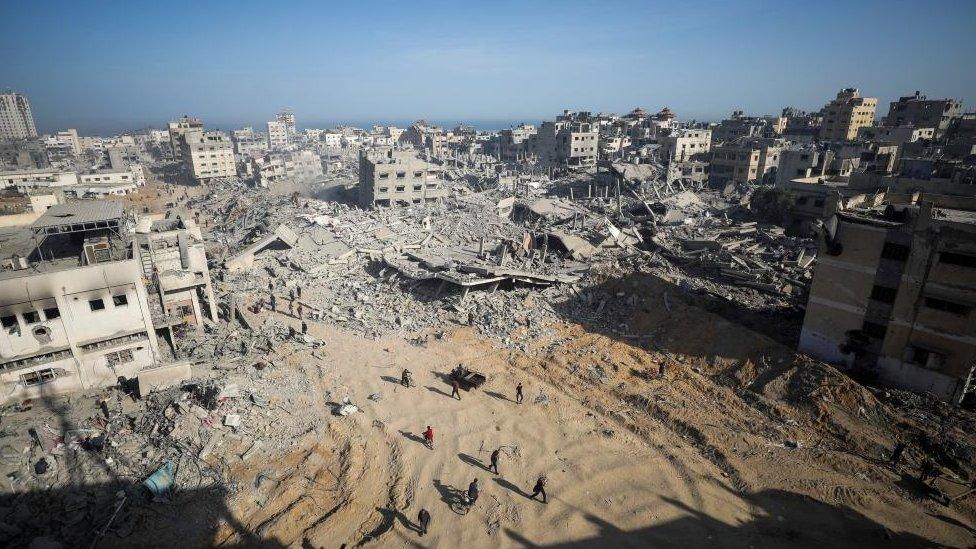
Large parts of the Gaza Strip have been devastated by Israel's operation, including al-Shifa hospital in Gaza City, left in ruins after a two-week IDF raid
Labour has not called for a suspension, but is urging the government to publish internal legal advice on whether Israel is in breach of international law.
The SNP is calling for Parliament to be recalled from its current Easter break, ending on 15 April, to debate the issue.
Conservative MP Paul Bristow said the idea British-made arms could be used in action that kills innocent civilians in Gaza "turns the stomach."
But his fellow Tory MP and former home secretary Suella Braverman rejected a ban, telling the BBC "We owe it to Israel to stand with them."
'Closest ally in this region'
Speaking during a trip to Israel, she said: "I think that it would be a tragic shame if we were to walk away from our closest ally in this region."
Fellow Conservative MP Bob Seely, who sits on the Foreign Affairs committee, said those calling on the government to end arms sales were engaging in "shallow gesture politics".
He told BBC Newsnight "The reality is that we supply 0.02% of Israel's arms imports, which is a meaninglessly small figure, and actually by blocking it, effectively, this is shallow gesture politics and nothing but."
Mr Seely said the UK should instead "double down" on its relationship with Israel.
Much of the Gaza Strip has been devastated during the Israeli military operations that began after Hamas gunmen attacked southern Israel on 7 October, killing about 1,200 people and seizing 253 hostages.
About 130 of the hostages have not been released, with at least 34 of them presumed to be dead.
More than 32,916 people have been killed in Gaza since that first week of October, the Hamas-run health ministry says.
Additional reporting by Emily Atkinson.
Related topics
- Published2 April 2024
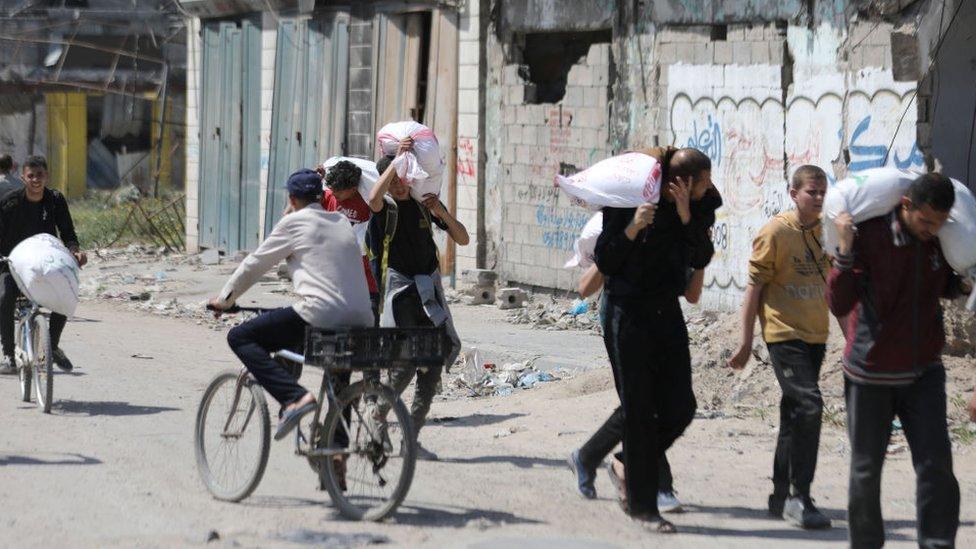
- Published2 April 2024
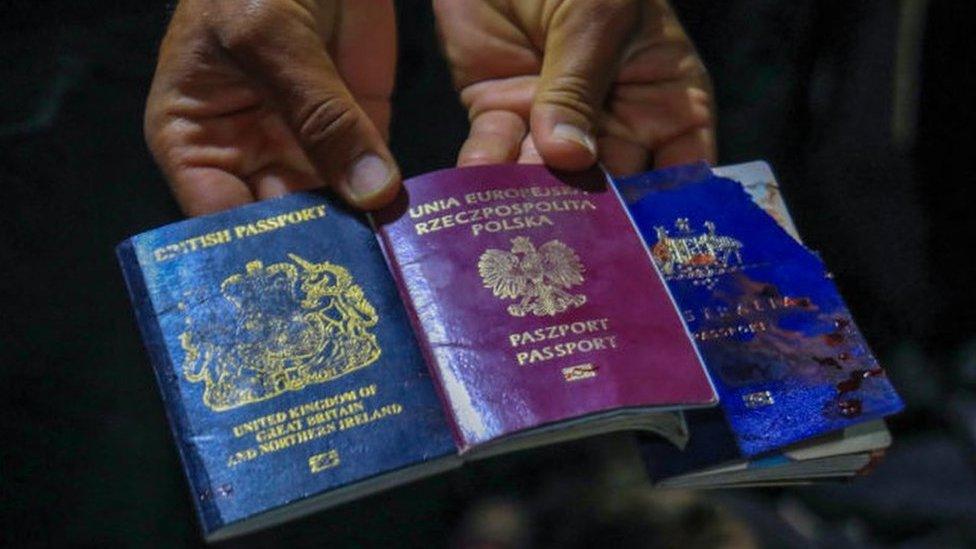
- Published3 April 2024
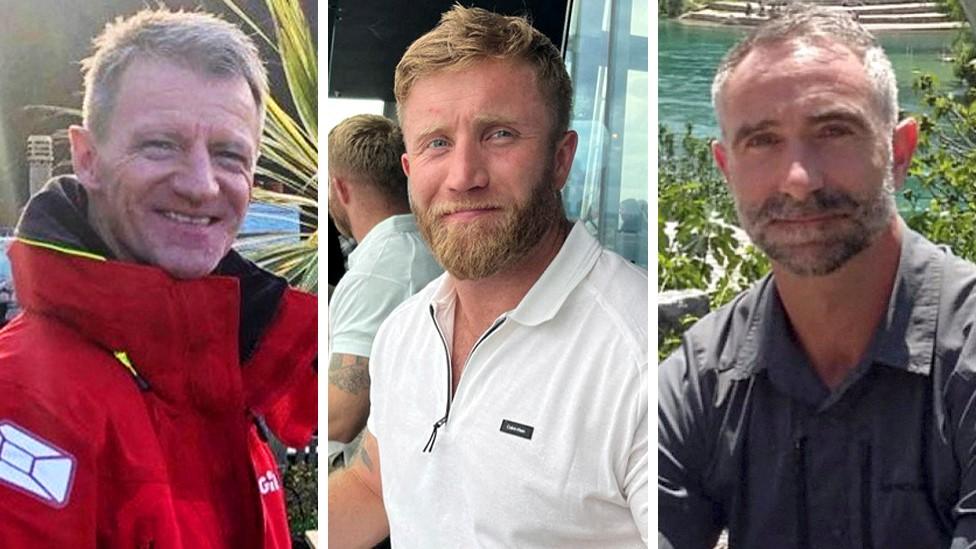
- Published5 April 2024
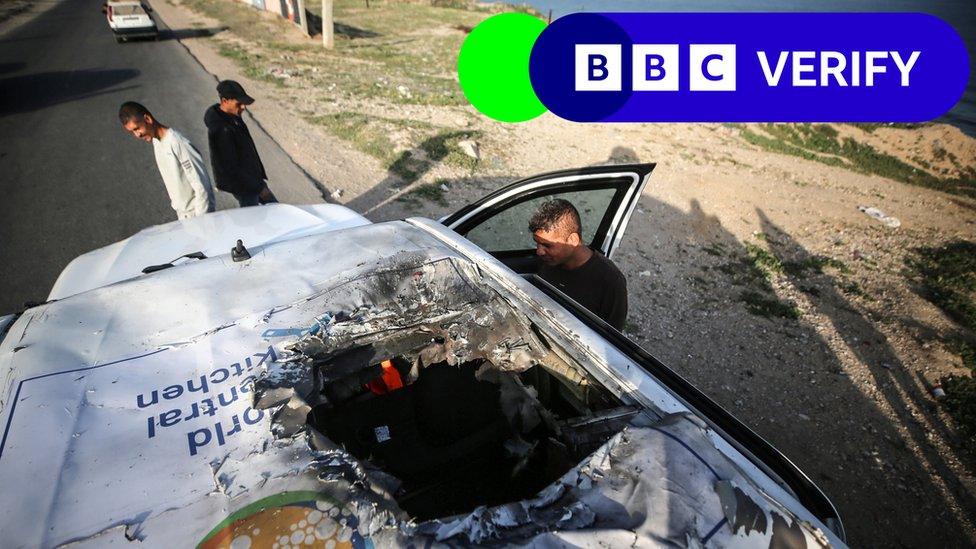
- Published4 April 2024
